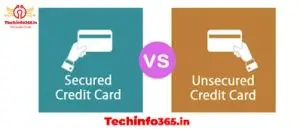There
Are Mainly Two Types Of Credit Cards :-
Unsecured and secured credit cards are two different types
of credit cards that cater to individuals with different financial situations
and credit histories. Here’s an overview of each:
Unsecured
Credit Cards:
- No Collateral Required: Unsecured credit cards do not
require any collateral or security deposit.
- Credit Limit Determined by Creditworthiness: The
credit limit is determined based on the individual’s creditworthiness, income,
and credit history.
- Risk for Lenders: Since there is no collateral, these
cards carry more risk for the card issuer. As a result, they are typically
offered to individuals with a good to excellent credit score.
- Interest Rates and Fees: The interest rates and fees
on unsecured credit cards can vary widely based on the individual’s credit
profile.
Secured /FD Credit Cards:
- Requires Collateral: Secured credit cards are backed
by a security deposit, usually in the form of a fixed deposit with the issuing
bank.
- Credit Limit Tied to Deposit: The credit limit is
often directly related to the amount of the security deposit. For example, if
you deposit ₹20,000, your credit limit may be around ₹20,000.
- Credit Building Tool: Secured credit cards are often
used by individuals with limited credit history, no credit history, or a poor
credit score to build or rebuild their credit.
- Lower Risk for Lenders: Since there is collateral,
the risk for the card issuer is lower, making secured cards more accessible to
those with lower credit scores.
- Interest Rates and Fees: Interest rates and fees can
still vary, but secured credit cards may have higher fees and interest rates
compared to unsecured cards.
If you have no credit history or a low CIBIL
score in India, it can be challenging to get approved for traditional credit
cards. However, there are certain credit cards designed for individuals with no
credit history or a low CIBIL score. These cards are often referred to as
“secured credit cards” or “credit builder cards.”
Here are some options you might consider:
Choosing
Between Secured and Unsecured Credit Cards:
- If you have a good credit history, you may be eligible for
unsecured credit cards with better terms and lower interest rates. - If you have no credit history or a poor credit score, a
secured credit card can be a useful tool to establish or rebuild credit. - Secured credit cards can be a stepping stone to eventually
qualifying for unsecured credit cards as you build a positive credit history.
Whether you choose an unsecured or secured credit card
depends on your current credit situation and financial goals. It’s crucial to
read the terms and conditions of any credit card offer carefully before
applying.
Types
Of Credit Cards:
Credit cards come in various types, each designed to cater
to different financial needs and lifestyles. Here are some common types of
credit cards:
1. Standard
Credit Cards:
- Basic credit cards with a predefined credit limit.
- Often suitable for regular, everyday purchases.
2. Reward
Credit Cards:
- Earn rewards points or cashback for every purchase.
- Rewards may include travel miles, merchandise, or discounts.
3. Cashback
Credit Cards:
- Provide a percentage of the purchase amount as cashback.
- Rewards are typically credited to the cardholder’s account.
4. Travel
Credit Cards:
- Geared towards frequent travelers, offering travel-related
perks. - Benefits may include airline miles, hotel discounts, travel
insurance, and airport lounge access.
5. Secured
Credit Cards:
- Requires a security deposit as collateral.
- Suitable for individuals with limited or no credit history.
6. Business
Credit Cards:
- Designed for business expenses, helping manage business
finances separately. - May offer rewards or benefits tailored for business
spending.
7. Student
Credit Cards:
- Aimed at students with limited credit history.
- May have lower credit limits and educational resources on
responsible credit use.
8. Balance
Transfer Credit Cards:
- Allows transferring balances from one card to another.
- Typically used to consolidate debt and take advantage of
lower interest rates.
9. Premium
or Luxury Credit Cards:
- Offer high credit limits and exclusive benefits.
- Often include perks such as concierge services, premium
travel benefits, and access to luxury events.
10. Fuel
Credit Cards:
- Provide discounts, cashback, or reward points on fuel
purchases. - Ideal for individuals who frequently use their cards for
refueling.
11. Charge
Cards:
- Require the full balance to be paid each month.
- Do not have a preset spending limit but may have a dynamic
limit based on spending habits.
12. Low-Interest
Credit Cards:
- Feature lower interest rates compared to standard cards.
- Suitable for individuals who carry a balance and want to
minimize interest charges.
13. No
Annual Fee Credit Cards:
- Do not charge an annual fee for card membership.
- Can be a good option for those looking to avoid yearly fees.
Apply
for a secured credit card with a bank in India:
1. Choose a Bank:Select a bank that offers secured credit cards. Common banks
in India that provide such cards include State Bank of India (SBI), ICICI Bank,
Axis Bank, and HDFC Bank.
2. Visit the Bank’s Official Website:Go to the official website of the bank of your choice.
3. Navigate to Credit Cards Section:Look for the “Credit Cards” or “Cards”
section on the bank’s website.
4. Explore Credit Card Options:Explore the various credit card options available. Look
specifically for information on secured credit cards.
5. Read Terms and Conditions:Click on the details of the secured credit card you are
interested in. Read the terms and conditions, including interest rates, fees,
and any other relevant information.
6. Application Process:Find the link or section for applying for the credit card.
This may be labeled as “Apply Now” or something similar.
7. Fill Out the Application Form:Click on the application link and fill out the required
information in the application form. This may include personal details, contact
information, employment details, and more.
8. Submit Documents:You may be required to submit documents such as proof of identity,
address, and income. Follow the bank’s instructions on document submission.
9. Deposit for Secured Credit Card:For secured credit cards, you’ll likely need to make a fixed
deposit as collateral. The bank will provide instructions on how to do this.
10. Wait for Approval:After submitting your application and documents, wait for
the bank to review and approve your application.
Remember to carefully review all terms and conditions,
including any fees associated with the card. Additionally, ensure that the
bank’s secured credit card aligns with your financial needs and goals. If you
have specific questions or concerns, it’s advisable to contact the bank
directly or visit the nearest branch for assistance.
These
Banks Secured/FD Credit Cards You Can Apply :-
1. ICICI
Bank Secured Instant Credit Card:
- Credit Building: Secured credit cards are often designed for individuals who are new to credit or are looking to rebuild their credit history. Using the card responsibly and making timely payments can contribute to improving your credit score.
- Security Deposit: Since it’s a secured card, you are required to make a security deposit, usually equal to the credit limit. This deposit acts as collateral and can be refunded when you close the account in good standing.
- Credit Limit: Your credit limit is determined by the amount of the security deposit you provide. Responsible use of the card and timely payments may lead to credit limit increases over time.
- Accepted Worldwide: Secured credit cards are generally accepted globally, allowing you to make purchases and payments wherever credit cards are accepted.
- Online Account Management: Many secured credit cards, like regular credit cards, offer online account management. This allows you to track your transactions, view statements, and manage your account conveniently.
- Upgrade Opportunities: Some financial institutions may offer the possibility of upgrading to an unsecured credit card after demonstrating responsible credit behavior over a period of time.
- Interest on Security Deposit: In some cases, the security deposit may earn interest while it is held by the bank.his is a secured credit card where you need to provide a
fixed deposit as collateral.
2. Axis
Bank Insta Easy Credit Card:
- Quick Approval: Many instant or “Insta” credit cards aim to provide quick approval processes, allowing you to access credit relatively faster compared to traditional credit cards.
- Credit Limit: The credit limit on the card would depend on various factors such as your credit history and income. It provides you with a predetermined amount of credit that you can use for purchases.
- Cash Withdrawal: Credit cards often allow you to withdraw cash from ATMs. However, note that cash withdrawals may attract fees and higher interest rates compared to regular purchases.
- Rewards and Cashback: Some credit cards offer rewards programs or cashback on eligible purchases. This allows you to earn points or get a percentage of your spending back, providing additional benefits.
- Global Acceptance: Credit cards are generally accepted worldwide, making them convenient for both domestic and international transactions.
- EMI Options: Many credit cards, including some instant ones, offer the option to convert high-value purchases into Equated Monthly Installments (EMIs), providing flexibility in repayment.
- Online Account Management: Most credit cards come with online account management, allowing you to track your transactions, view statements, and manage your account conveniently.
- Contactless Payments: Some credit cards offer contactless payment features, allowing you to make secure and quick transactions by tapping the card on compatible payment terminals.
3. HDFC
Bank Secured Credit Card:
- Credit Building: Secured credit cards are designed for individuals looking to build or rebuild their credit history. Responsible use of the card and timely payments can positively impact your credit score.
- Security Deposit: A secured credit card requires a security deposit, which is typically equal to the credit limit. This deposit acts as collateral and can be refunded when you close the account in good standing.
- Credit Limit: The credit limit is determined by the amount of the security deposit. Responsible use of the card may lead to credit limit increases over time.
- Global Acceptance: Secured credit cards are generally accepted globally, making them suitable for both domestic and international transactions.
- Online Account Management: Most secured credit cards, like regular credit cards, offer online account management. This allows you to track your transactions, view statements, and manage your account conveniently.
- Upgrade Opportunities: Some banks may offer the possibility of upgrading to an unsecured credit card after demonstrating responsible credit behavior over a period of time.
- Interest on Security Deposit: In some cases, the security deposit may earn interest while it is held by the bank.
- EMI Options: Some secured credit cards may provide the option to convert high-value purchases into Equated Monthly Installments (EMIs), offering flexibility in repayment.
- Cash Withdrawals: Secured credit cards often allow cash withdrawals from ATMs, although this may attract fees and higher interest rates compared to regular purchases.
4. Kotak
Mahindra Bank Aqua Gold Credit Card:
- Credit Limit: The credit card provides you with a predetermined credit limit based on your creditworthiness and financial profile.
- Reward Points: Credit cards often come with a rewards program where you earn points for every transaction. These points can be redeemed for various rewards, such as merchandise, gift vouchers, or statement credits.
- Cashback: Some credit cards offer cashback on specific categories of spending, providing you with a percentage of your purchases back as a rebate.
- Fuel Surcharge Waiver: Credit cards may offer a waiver on fuel surcharges at designated fuel stations, providing cost savings when you refuel your vehicle.
- Global Acceptance: Credit cards are generally accepted worldwide, allowing you to make purchases and transactions internationally.
- Online Account Management: Most credit cards, including the Aqua Gold Credit Card, offer online account management, allowing you to monitor transactions, check statements, and manage your account conveniently.
- Insurance Coverage: Some credit cards come with insurance coverage, which may include features like travel insurance, purchase protection, or other insurance benefits.
- EMI Options: You may have the option to convert high-value purchases into Equated Monthly Installments (EMIs), providing flexibility in repayment.
- Airport Lounge Access: Premium credit cards may offer complimentary access to airport lounges, allowing you to enjoy various amenities while traveling.his is an entry-level credit card that may be available to
individuals with limited or no credit history.
5. SBI
Card Unnati:
- Zero Annual Fee: The SBI Card Unnati is known for having no annual fee, making it a cost-effective option for cardholders.
- Credit Building: The card may be designed to help individuals build or improve their credit history. It could be accessible to a wide range of applicants, including those new to credit.
- Cashback Rewards: Some credit cards offer cashback rewards on specific spending categories or all transactions, providing cardholders with a percentage of their purchases back as cashback.
- Global Acceptance: Like other credit cards, the SBI Card Unnati is generally accepted worldwide, allowing users to make purchases and transactions internationally.
- Fuel Surcharge Waiver: Credit cards often provide a waiver on fuel surcharges at designated fuel stations, helping cardholders save money on fuel expenses.
- Online Account Management: Most credit cards offer online account management, allowing cardholders to monitor transactions, check statements, and manage their accounts conveniently through online platforms.
- Credit Limit: The card provides a predetermined credit limit based on the applicant’s creditworthiness and financial profile.
- EMI Options: Cardholders may have the option to convert high-value purchases into Equated Monthly Installments (EMIs), offering flexibility in repayment.BI Card Unnati is designed for people with no credit
history.
- Remember that these cards are designed to help you build or
rebuild your credit history. Make sure to pay your bills on time and use the
card responsibly to improve your credit score over time. Additionally, it’s
crucial to review the terms and conditions, including fees and interest rates,
before applying for any credit card. Always choose a card that aligns with your
financial situation and goals.






Hi i think that i saw you visited my web site thus i came to Return the favore I am attempting to find things to improve my web siteI suppose its ok to use some of your ideas.